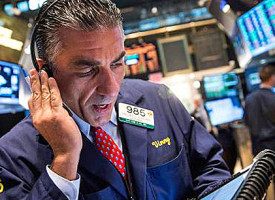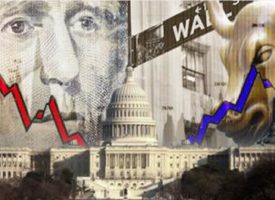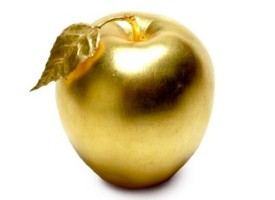On the heels of another wild trading week, is the Bank for International Settlements (BIS) setting up the world for another meltdown?
(King World News) Stephen Leeb: “In 2013, the Bank of International Settlements (BIS), one of the most powerful institutions you may never have heard of – blew it. It snubbed gold. I’ll explain how in a moment – contributing to gold sinking from $1,800 an ounce in October 2012 to below $1,200 by the end of June 2013, a massive 35 percent plunge in a mere eight months. The downtrend continued until the end of last year when gold briefly traded below $1,050…
Continue reading the Stephen Leeb interview below…
Advertisement
To hear which company investors & institutions around the globe are flocking to
that has one of the best gold & silver purchase & storage platforms
in the world click on the logo:

Stephen Leeb continues: “Forget about the impact on gold investors. The real tragedy is that the BIS’s disdain of gold paved the way for today’s utterly untenable global economic mess. The ironic upshot is that today the world desperately needs gold to assume a more prominent monetary role. If central banks don’t act accordingly, the world is likely to descend into chaos in which gold will seize such a role anyway. Either way, gold will win.
 The Tower Of Basel (BIS) – The Central Bank That Really Runs The World
The Tower Of Basel (BIS) – The Central Bank That Really Runs The World
Let’s return to the BIS, known as the central bank of central banks. In 2013 the BIS, in the aftermath of the financial crisis, had the job of refining the rules that would make sure banks would have enough of a liquidity buffer to ensure there would be no repetition of the 2008 financial meltdown. During the worst of the crisis banks were left so high and dry that GE nearly missed a payroll because it did not have access to enough liquidity. The goal was a buffer large enough to cover net bank withdrawals over an extremely stressful 30-day period.
It was widely assumed that the BIS would include gold as a financial asset banks could use as part of their liquidity. But, amazingly, when the BIS issued its so-called Basel III recommendations, gold was nowhere to be found. Instead, the BIS listed sovereign debt, common stocks, and BBB+ bonds as among acceptable forms of liquidity — some with a haircut, i.e., at less than full face value.
Omitting gold was extraordinary given gold’s outstanding performance. Between September 30, 2007 (when the Great Recession started) through March 6, 2009, when the market bottomed, gold’s 26 percent gain left every other asset in the dust. Only long-dated U.S. Treasuries came close. Germany’s 30-year note lost about 20 percent, while Britain’s 20-year bond lost about 40 percent. The S&P 500 lost over 55 percent. Furthermore, only U.S. bonds were less volatile than gold.
In other words, by most objective measures gold would have been far and away the most suitable liquidity buffer. Yet the BIS shunned gold in favor of common stocks and mediocre bonds. Let’s note in passing that the pound, which had been designated as a no-haircut liquidity buffer, is the currency of a country on the verge of cutting its ties to Europe while owing foreigners nearly six times its GDP. Also striking is that the assets the BIS favored were mostly those that could be created at will – a.k.a money printing.
 BIS’s Real Motive As The West Is Headed For Another Meltdown
BIS’s Real Motive As The West Is Headed For Another Meltdown
You have to figure that the BIS was either wanting another crisis or, more likely, had some ulterior motive. The problem is that the only plausible ulterior motive was one that virtually guaranteed another crisis down the road – which is exactly how things have played out.
The BIS, in my view, was intent on preventing gold from being viewed as a currency on par with the dollar. Its fear was that if gold – the only financial asset that can’t be created at will – were treated as a currency, it would quickly grab status as the premier financial asset, the de facto reserve currency of choice. The dollar would play second fiddle, with very uncertain consequences for America.
Flash forward three years. The BIS and Western central bankers in general may feel satisfied that they achieved one goal: the dollar remains the world’s most important reserve currency. But insofar as another goal was to protect the West from another meltdown, they should be a lot less pleased with themselves.
 BIS Warns Global Economy Highly Exposed
BIS Warns Global Economy Highly Exposed
In its most recent report, released June 30, BIS acknowledged the worsening outlook, writing: “One could speak of a ‘risky trinity’: productivity growth that is unusually low…..global debt levels that are historically high, raising financial stability risks…….and a (sic) room for policy maneuver that is remarkably narrow, leaving the global economy highly exposed.”
But based on what the BIS had sought in 2013, it should be jumping for joy. After all, high-quality debt is a form of liquidity, and it’s more than abundant, with no end in sight to how much more will be created. Debt creation is a vicious circle: the more debt, the more debt transactions, and the more debt needed for a buffer.
Unfortunately, when you consider the unlimited ability to create debt along with $8 trillion of sovereign debt sporting rates that have been negative for a record amount of time and top it off with a vicious circle that nearly assures ever more debt creation, you have to conclude the West is all dressed up with no place to go. In the West the kinds of investments – in desperately needed infrastructure – that would spur productivity and employ many of those languishing in the bottom 50 percent are viewed as too risky by the private sector and too burdensome for the public sector.
Imagine how different things would look today if the BIS had granted gold its rightful role as a liquidity buffer. Its price would have soared, but those gains would have meant less need for money printing. There would be little prospect for the kind of vicious circle that prevails today, since gold would rise as new debt was created. There would be no need to backstop debt with more debt, and private and public investors would be far more willing to invest in infrastructure and other productivity-enhancing projects with long-term payoffs.
 Gold And China Are Getting The Last Laugh
Gold And China Are Getting The Last Laugh
But gold is getting the last laugh, along with China. It will be the only currency left standing when the house of cards falls. The BIS can at least partially rectify its mistake now either by adding gold as a liquidity buffer with no haircut or, perhaps, in concert with the IMF, including gold as part of the basket of SDR currencies. But it may already be too late to save a major role for the dollar. Why? Because of all the gold that China has been amassing.
Counting its sovereign wealth fund, China has approximately $4 trillion in reserves, of which only a little over $1 trillion is in U.S. Treasury securities. How the other $3 trillion is invested is a state secret. But can anyone seriously think that Li and Xi aren’t aware of the travails of Britain, Europe, and Japan, the other IMF-designated reserves currencies? And we know that China loves gold. We also know that it wants to control currency creation, as evidenced by its leadership in cyber money, which is made possible by the country’s remarkable surge to No. 1 in the supercomputer arena. China’s extraordinary success in supercomputers is just one more proof of how much China can do in a short time.
The 30,000 tonnes of gold held by central banks has a value of about $1.2 trillion. The value of gold held for investment is valued at about $1.4 trillion. Our point is that China has the wherewithal to have bought nearly all the gold that is readily for sale (this excludes the nearly half of the world’s gold that’s in the form of jewelry). Don’t misunderstand us: I am in no way implying that China has done so, or that it owns anything like 60 thousand tonnes of gold. But it’s a near certainty that it owns far more gold than the paltry 1,800 tonnes that it most recently reported owning, as well as more than the 8,000 tonnes the U.S. is supposed to own.
 China Will Dictate The New Monetary Order
China Will Dictate The New Monetary Order
Our bet is that China owns at least enough gold to let it dictate the shape of a new monetary order. The reality is that economic power has been shifting to the East, and it’s probably too late to forestall this momentous reordering.
It is not, however, too late for investors to benefit by buying precious metals. We are likely facing one of the greatest, if not the greatest, bull markets of all time. Investors should buy gold – and especially gold miners – and buy silver – especially silver miners: miners will offer the greatest leverage to gains in the underlying metals. And be sure to put those BIS decision makers on your Christmas card list as you watch your gains pile up.”
***KWN has now released the timely powerful audio interview discussing the gold and silver markets with Rick Rule and you can access it by CLICKING HERE OR ON THE IMAGE BELOW.
***Also Just Released: Commercial Short Positions In Gold & Silver Hit Another All-Time Record! Click Here.
 © 2016 by King World News®. All Rights Reserved. This material may not be published, broadcast, rewritten, or redistributed. However, linking directly to the articles is permitted and encouraged.
© 2016 by King World News®. All Rights Reserved. This material may not be published, broadcast, rewritten, or redistributed. However, linking directly to the articles is permitted and encouraged.







